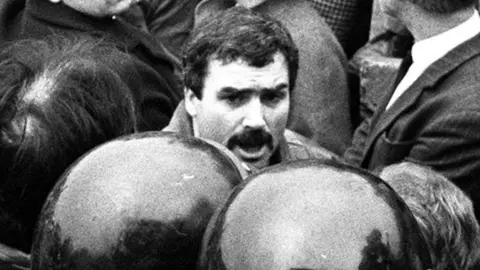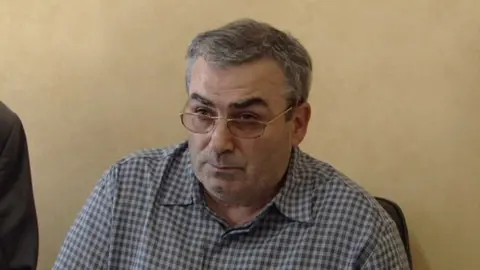Stakeknife: Operation Kenova report into IRA spy due in early 2023
 Pacemaker
PacemakerA report into the activities of an Army agent in the IRA during the Northern Ireland Troubles, codenamed Stakeknife, will be published early next year.
It is currently being prepared by Jon Boutcher, the retired chief constable of Bedfordshire police.
His Operation Kenova team has investigated historical crimes, covering murder and torture, and the role of the state, including MI5.
Stakeknife is alleged to be Freddie Scappaticci but he denies the claim.
The west Belfast man left Northern Ireland in 2003 after several media organisations alleged he had been working for the Army while he was at the head of the IRA's internal security unit.
It was responsible for identifying suspected informers, many of whom were murdered by the IRA after being kidnapped and tortured.
Mr Boutcher's report is being prepared at a time when the government is advancing legacy legislation intended to draw a line under the Troubles by ending all criminal prosecutions.
The Public Prosecution Service (PPS) currently has about 30 files related to the Stakeknife investigation awaiting decisions.
In a statement, Mr Boutcher said: "While there is much discussion about the future of legacy following the government's proposed bill, the bill should not impact the release of the Kenova's findings.
"Now the process for release has been finalised, we can start the work of engaging with all the relevant parties before publication, which I anticipate will be early 2023.
"This will finally mean we can address some of the unanswered questions from families."
He added that in coming weeks, he will be contacting organisations his report will criticise or anyone who might be "adversely affected" by it.
The report will address "what was and was not happening" between organisations - the IRA and its internal security unit, the police, the Army, the intelligence services and agents and informers.
It will look at whether the state did not protect people before abductions and murders were committed and the approach to investigating the crimes.
According to documentation on the Operation Kenova website, the responsibility to publish the report will rest with the Police Service of Northern Ireland (PSNI) once it has received it from Mr Boutcher.
It was the PSNI which commissioned his investigation in 2016.
The report will also undergo a "security checking process" by the government cabinet office.
Documentation stated "this will not involve the exercise of any power of executive censorship".

Who is Stakeknife?

Fred Scappaticci is alleged to have been the most high-ranking British agent within the Provisional IRA, an individual given the codename Stakeknife.
Now in his 70s, Mr Scappaticci was the grandson of an Italian immigrant who came to Northern Ireland in search of work.
In 2003, he told the BBC he had been involved in the republican movement but denied claims he was Stakeknife.
Mr Scappaticci left Northern Ireland 18 years ago, when the media first published the allegations identifying him as the Army agent.
Stakeknife is believed to have led the IRA's internal security unit, known as "the nutting squad".
It was responsible for identifying and interrogating suspected informers.

The report had been scheduled to be made public by November 2022.
Mr Boutcher's team of 50-plus detectives has also been looking at other troubles cases, including as many as 120 murders carried out by the UVF's so-called Glenanne gang.
These cases will be covered by separate reports at a later point in time.
They are:
- Operation Mizzenmast - the murder of Jean Smyth-Campbell in 1972
- Operation Turma - the murder of three RUC officers on Kinnego Embankment in 1982
- The Barnard Review into what has become known as the Glenanne Gang series.
The PPS said the Stakeknife files submitted by the Operation Kenova team remain under "active consideration".
A statement added: "Work is progressing as quickly as possible and decisions will issue in due course."
